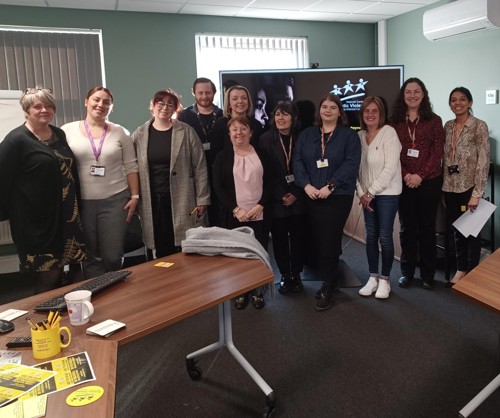Every 10 minutes, a woman is killed.
For another year BCHG took part in 16 Days of Activism against Gender-Based Violence, putting a spotlight on the impacts of domestic abuse.
To kick off the campaign, BCHG colleagues attended an informative session led by the National Centre for Domestic Violence (NCDV). An important reflection from the session was that smaller instances of domestic abuse are also collectively important and how crucial it is to report them.

NCDV have a free mobile app which acts a quick domestic abuse referral system. Referrals can be made via BCHG on behalf of a BCHG customer who may be a victim of domestic abuse.
To allow survivors a secure and more confidential way to reach out, we introduced our new YouMatter@bchg.co.uk email address where customers can report to BCHG instances of domestic abuse.

With the ongoing cost of living pressures, economic abuse is rising and BCHG shared that it can take many forms: whether it is your partner restricting how you use money and the things that you own, sabotaging income and access to money and/or exploiting your economic situation – these are all examples of economic abuse.
Surviving Economic Abuse (SEA) reported this year that 4.1 million UK women experienced economic abuse from a current or former partner. Women from Minority Ethnic communities were over twice as likely to experience economic abuse than White women. Although disabled women were just less than twice as likely to experience economic abuse than non-disabled women, people with physical disabilities are less likely to escape from their abuser. Other disabilities can limit a person’s ability to recognise potential signs of abuse.

Although there is a higher percentage of domestic abuse victim-survivors who are female, we’ve reflected that it can impact everyone, regardless of their sexual identity, social background, age, religion or ethnicity.
Support for male victim-survivors is available through The ManKind Initiative : https://mankind.org.uk and Ask Marc - https://askmarc.org.uk locally in the Black Country.
On Monday 2nd December we held our very own 'Orange Day' where we encouraged colleagues to wear orange or include it in their virtual meeting backgrounds to show their support and raise awareness.
During the awareness campaign, BCHG ran a 'Secret Santa' gift appeal for Black Country Women's Aid. We delivered all gifts donated by BCHG colleagues to BCWA who were immensely grateful, making Christmas a special time for the women staying at the refuge. A true example of The BCHG Way, and especially our 'We care' value.

On 10th December, UN’s Human Rights Day and last day of the campaign, BCHG colleagues also attended a powerful conference in Dudley, focusing on domestic abuse and violence against women and girls (VAWG).
One of the key takeaways was hearing from Waythrough, a new organisation with a refreshing approach to addressing perpetrator accountability. They challenge the norm by asking perpetrators why they choose to harm those they love, focusing on changing their behaviour rather than questioning victims. It's a vital step in breaking the cycle of abuse and preventing future harm in new relationships.
We also discussed difficult topics, including the disproportionate sentences faced by women who kill their abusers compared to their male counterparts. A DAS study shared alarming findings about how women survivors of abuse are often misdiagnosed with mental health conditions when their behaviours are a direct result of the abuse they’ve endured—such as being diagnosed with OCD due to strict, controlling regimes imposed by their abusers.
In addition, AAFDA highlighted the heart-breaking reality of families of domestic abuse victims who have gone on to commit suicide or whose deaths remain unexplained.
Black Country Women’s Aid also shared insights into how abuse is evolving in the digital age, offering a tool to help survivors protect themselves online - Digital Breakup is an interactive tool designed to provide awareness and understanding of the various digital platforms a partner might have access to, whether it’s social media accounts, online banking, or live location through apps such as Uber and Strava. They also emphasized the emotional, physical, and professional risks staff face when working with both perpetrators and survivors, offering valuable resources like Hollie Guard – Personal Safety App.
The conference ended with an important conversation on youth abuse, stressing the importance of risk assessments in supporting young people affected by domestic violence.
There’s still so much more to do, with 1 in 4 women experiencing some form of domestic abuse in their life, but we’re making progress.



